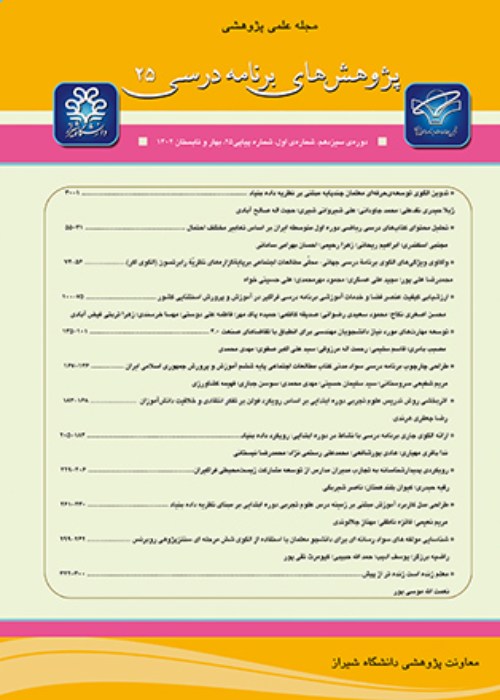The Requirements of the Participatory Teaching-Learning Process in Higher Education based on Needs, Interests, and Skills: A Case Study
Adaptation of teaching methods to the characteristics and generational insights of learners is one of the important principles in effective teaching-learning. Today, the use of active teaching-learning approaches, including participatory strategies, is expanding. Certainly, the application of a participatory teaching-learning approach tailored to the needs, desires, and skills of students leads to the creation of numerous and diverse learning opportunities for students. In contrast, the assignment of academic activities which do not correspond to the generational characteristics of students reduces their motivation and results in academic failure. Therefore, identifying the requirements of participatory teaching-learning for today’s generation of students is one of the most important issues in higher education. The aim of the present study was to explore and identify such factors involved in the participatory teaching-learning process based on the needs, interests, and skills of BA students. In this regard, the present study sought to answer the following questions. Research Questions 1- From experts’ opinion, what are the most important requirements of a participatory teaching-learning approach tailored to the needs, interests, and skills of today’s undergraduate students? 2- From the faculty members’ point of view, how appropriate is each of the requirements of participatory teaching-learning to the needs, interests, and skills of undergraduate students? 3- From the perspective of undergraduate students, how appropriate is each of the requirements of participatory teaching-learning to their needs, interests, and skills?
This study used an exploratory sequential mixed method design. The research method was content analysis in the qualitative part and descriptive survey in the quantitative part. The participants in the qualitative phase included experts in the two fields of educational and social sciences. Targeted snowball sampling continued with 31 participants until data saturation was reached. The statistical population of the quantitative phase consisted of professors and BA students from the two faculties of educational sciences and social sciences at the University of Tehran and the University of Isfahan. A sample of 121 professors and 349 students was selected using Cochran’s formula with the quota sampling method, proportional to population size (optimal allocation). In the qualitative part, semi-structured interviews were used to collect data while in the quantitative part, a researcher-made questionnaire, developed based on the indicators extracted from the analysis of the interviews in the qualitative part, was used to collect quantitative data. Eight experts confirmed the content validity of the questionnaire and interview questions. The reliability of the questionnaire was confirmed, with a Cronbach alpha coefficient of 0.93. In addition, the four criteria of credibility, dependability, confirmability, and transferability were used to enhance the rigor of the qualitative data. Thematic analysis (interpretive structure modeling) was used to analyze qualitative findings. In the quantitative phase, descriptive-inferential statistics in SPSS (version 25) were used for data analysis. Results According to the research findings, the most important requirements of the participatory teaching-learning that met the characteristics of today’s BA students were as follows: using group lesson activities, forming virtual science groups, adjusting the class layout in a face-to-face format, grouping students based on scientific support, grouping students based on talent diversity, encouraging scientific competition with a focus on its collective benefit, and, finally, encouraging group success.
In this study, the generational characteristics of today’s students, along with other contextual factors, were considered in determining the requirements of participatory teaching-learning. University instructors can benefit from the results of this study. Based on the findings, it can be concluded that the application of these requirements can increase students’ academic motivation and their scientific growth. Satisfying the requirements of participatory teaching-learning and other active and effective teaching-learning methods can foster learning. Thus, it is recommended that universities provide the necessary platforms to unlock the full potential of participatory learning. Furthermore, it is hoped that universities hold training courses and workshops to acquaint instructors and students with the skills required to benefit from this educational approach and encourage instructors to employ this method. To maximize the benefits of this educational participatory approach, instructors should define learning activities in a way that enhances group participation in real and virtual spaces and adjust the placement of students in the classroom in a way that facilitates face-to-face discussion. Finally, it is suggested that instructors encourage students to provide their peers with scientific support and group them in a way that spreads talents equally across the classroom, ergo promoting collective success.
- حق عضویت دریافتی صرف حمایت از نشریات عضو و نگهداری، تکمیل و توسعه مگیران میشود.
- پرداخت حق اشتراک و دانلود مقالات اجازه بازنشر آن در سایر رسانههای چاپی و دیجیتال را به کاربر نمیدهد.


